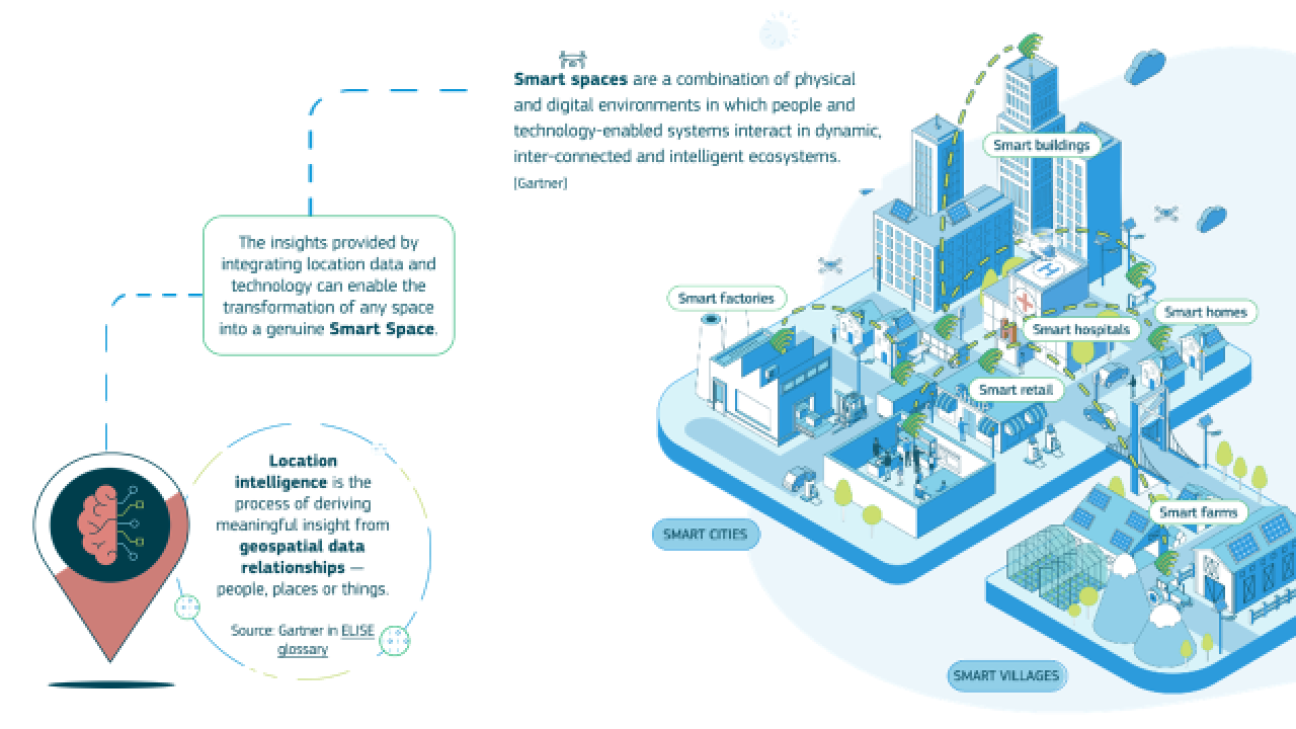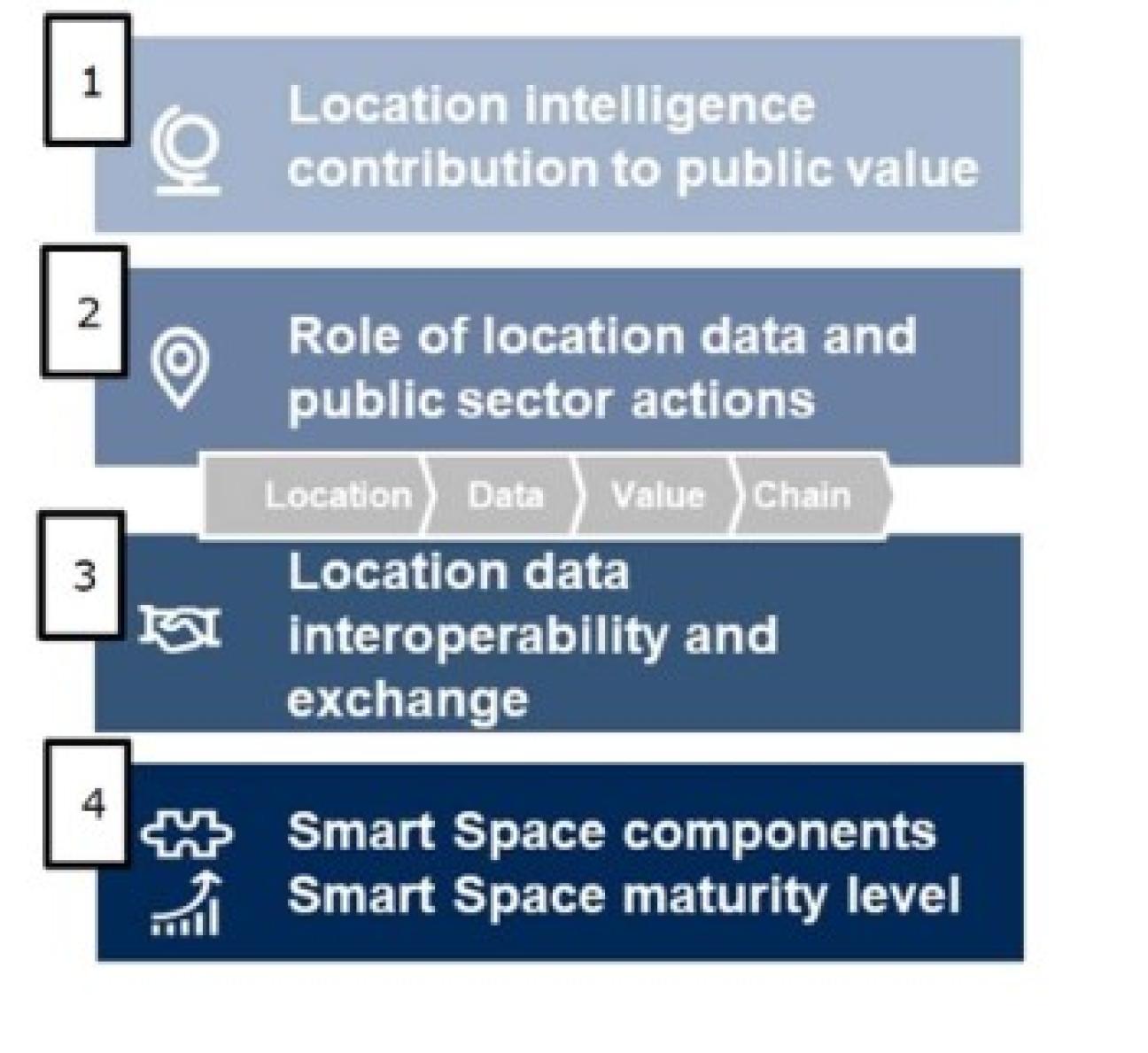Find our more on this activity on the Smart Space Benchmarking activity page
The market for Smart Spaces is expanding and a deeper understanding is needed to identify the challenges that Smart Spaces are facing in their development and the possible solutions that location intelligence might provide. Within the context of ELISE Action, this report tackles the opportunity to identify areas where the public sector and the private sector can help address these challenges.
The focus of the work presented here is on analysing the role of the public sector in relation to location intelligence, the application of AI, and the use of location data and technology, within selected Smart Spaces.
The Smart Space Benchmark Framework developed in this study provides a means to analyse and compare Smart Spaces across several dimensions, particularly the role of both location intelligence and the public sector. It should also help to reveal how data is used to create public value using location intelligence.

This report focused on three areas of work:
- A detailed approach and outcome of creating a benchmarking framework. This framework analysis location intelligence and the role of the public sector in Smart Spaces.
- An example of the framework's usage with four case studies and provided an analysis of the content of the case studies (benchmarking the roles of the public sector and benchmarking location intelligence and its contribution to public value).
- Also building on the case study content – benchmarked the enablers and barriers of a Smart Space in the case studies and proposed five areas where the public sector can act to lower the barriers of implementing Smart Spaces.
The aim of developing this benchmarking framework was to obtain a useful analysis tool able to provide a clear “picture” of a Smart Space. With the framework is possible to identify barriers, anticipate emerging needs, and derive recommendations for improving the status quo –especially for required actions of the public sector. The Framework benchmarks the Smart Space along four dimensions. These dimensions offer an structure that provide insight on the role of Location Intelligence in Smart Spaces and the role of the public sector:

The Framework was tested and developed with four case studies. Although all case studies are related to smart cities – with one covering a Smart Space between two cities – this Framework is applicable at the generic level of Smart Spaces, (smart city, smart village, smart building, etc.). The selected cases had a specific focus on:
- Cases covering a variety of public services in a Smart Space, typically focusing in the smart city area, from which related services can emerge, such as smart transport or building management.
- Cases which are promising in terms of identifying interoperability inside and between Smart Spaces.
Some of the findings of this report are that there is a strong case for location intelligence of public services, of the insight generated, its impact and its contribution to public value.
The public sector plays a varied and strong role in relation to location intelligence in Smart Spaces, including roles such as data provider, consumer, broker, or owner.
The public sector also plays a role in enforcing or supporting standardisation initiatives, which impact the Smart Spaces. These roles are analysed along the data value chain in the case studies.
Analysing the set of similar Smart Spaces (i.e., and Smart Cities) and their use cases through the Smart Space benchmarking framework provides insight into the diverse ways to implement them and the types of challenges they face.
The study benchmarked the barriers and enablers to the market uptake in the four case studies and analysed related public sector actions to derive a set of five areas where the public sector can act to lower the barriers of implementing Smart Spaces. Further research can similarly explore other types of Smart Spaces, such as Smart Buildings
Download the report here
How to cite this document: Valayer, C., Schade, S., Hernandez Quiros, L., Tsinaraki, C., Pignatelli, F. and Boguslawski, R., Benchmarking the role of the Public Sector and Location Intelligence in Smart Spaces, EUR 31109 EN, Publications Office of the European Union, Luxembourg, 2022, ISBN 978-92-76-53305-4, doi:10.2760/505730, JRC128862.

